Dental Student Doctors’ Perceptions on Internships
VerifiedAdded on 2023/05/28
|10
|2408
|240
AI Summary
This study explores the experiences and perceptions of clinical supervision in internships for dental students. It aims to identify the factors that constitute good clinical supervision from the perspective of the students. The study uses interpretive phenomenological qualitative design and thematic analysis approach.
Contribute Materials
Your contribution can guide someone’s learning journey. Share your
documents today.
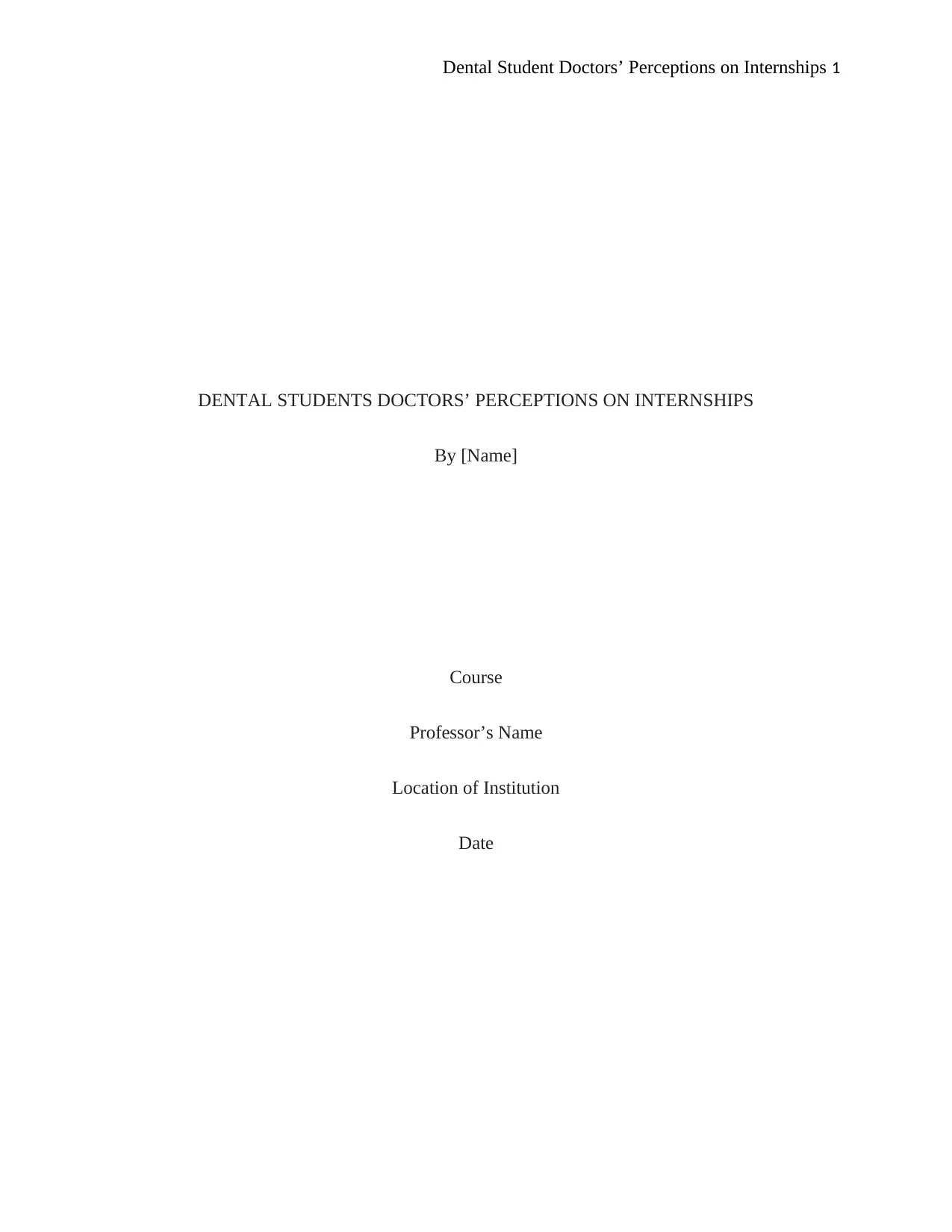
Dental Student Doctors’ Perceptions on Internships 1
DENTAL STUDENTS DOCTORS’ PERCEPTIONS ON INTERNSHIPS
By [Name]
Course
Professor’s Name
Location of Institution
Date
DENTAL STUDENTS DOCTORS’ PERCEPTIONS ON INTERNSHIPS
By [Name]
Course
Professor’s Name
Location of Institution
Date
Secure Best Marks with AI Grader
Need help grading? Try our AI Grader for instant feedback on your assignments.
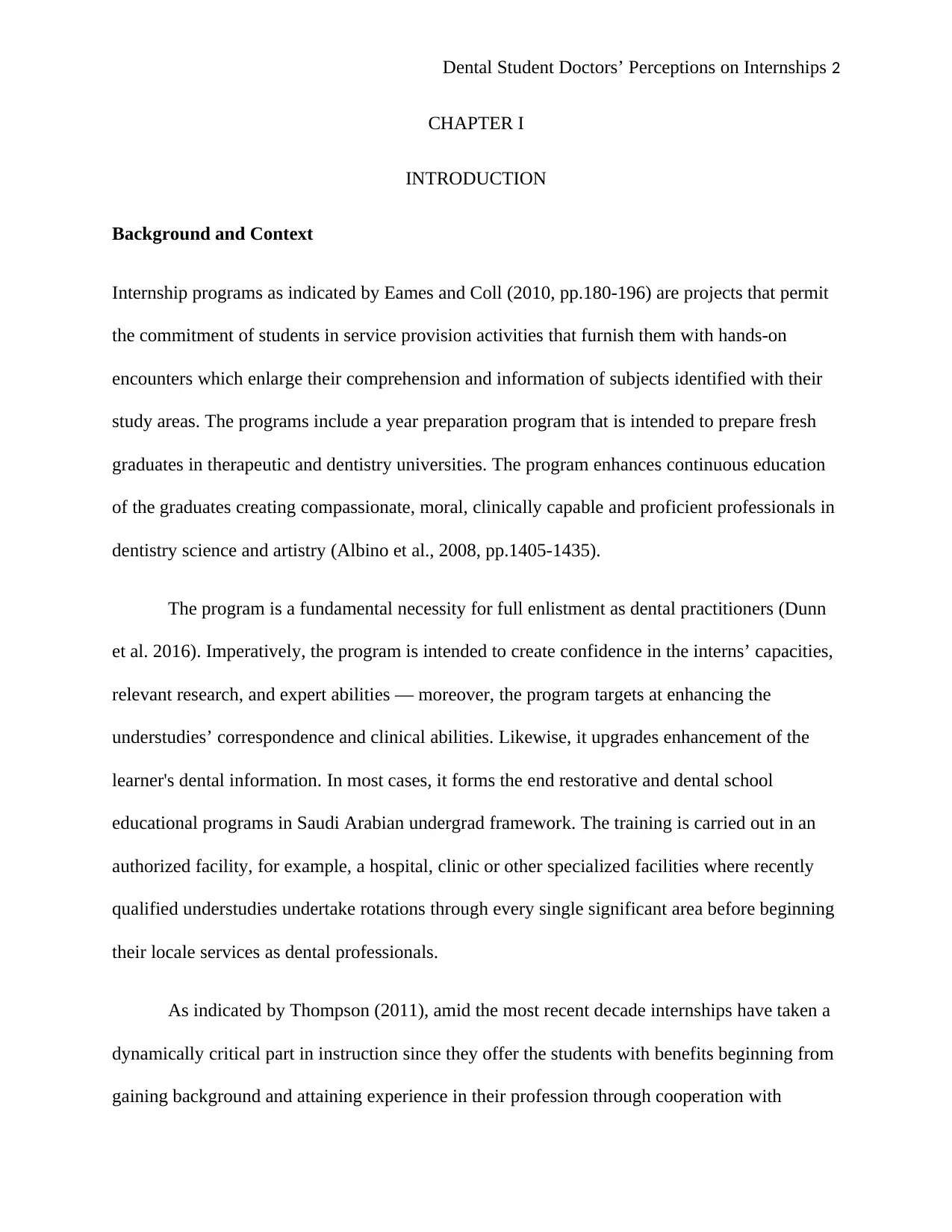
Dental Student Doctors’ Perceptions on Internships 2
CHAPTER I
INTRODUCTION
Background and Context
Internship programs as indicated by Eames and Coll (2010, pp.180-196) are projects that permit
the commitment of students in service provision activities that furnish them with hands-on
encounters which enlarge their comprehension and information of subjects identified with their
study areas. The programs include a year preparation program that is intended to prepare fresh
graduates in therapeutic and dentistry universities. The program enhances continuous education
of the graduates creating compassionate, moral, clinically capable and proficient professionals in
dentistry science and artistry (Albino et al., 2008, pp.1405-1435).
The program is a fundamental necessity for full enlistment as dental practitioners (Dunn
et al. 2016). Imperatively, the program is intended to create confidence in the interns’ capacities,
relevant research, and expert abilities — moreover, the program targets at enhancing the
understudies’ correspondence and clinical abilities. Likewise, it upgrades enhancement of the
learner's dental information. In most cases, it forms the end restorative and dental school
educational programs in Saudi Arabian undergrad framework. The training is carried out in an
authorized facility, for example, a hospital, clinic or other specialized facilities where recently
qualified understudies undertake rotations through every single significant area before beginning
their locale services as dental professionals.
As indicated by Thompson (2011), amid the most recent decade internships have taken a
dynamically critical part in instruction since they offer the students with benefits beginning from
gaining background and attaining experience in their profession through cooperation with
CHAPTER I
INTRODUCTION
Background and Context
Internship programs as indicated by Eames and Coll (2010, pp.180-196) are projects that permit
the commitment of students in service provision activities that furnish them with hands-on
encounters which enlarge their comprehension and information of subjects identified with their
study areas. The programs include a year preparation program that is intended to prepare fresh
graduates in therapeutic and dentistry universities. The program enhances continuous education
of the graduates creating compassionate, moral, clinically capable and proficient professionals in
dentistry science and artistry (Albino et al., 2008, pp.1405-1435).
The program is a fundamental necessity for full enlistment as dental practitioners (Dunn
et al. 2016). Imperatively, the program is intended to create confidence in the interns’ capacities,
relevant research, and expert abilities — moreover, the program targets at enhancing the
understudies’ correspondence and clinical abilities. Likewise, it upgrades enhancement of the
learner's dental information. In most cases, it forms the end restorative and dental school
educational programs in Saudi Arabian undergrad framework. The training is carried out in an
authorized facility, for example, a hospital, clinic or other specialized facilities where recently
qualified understudies undertake rotations through every single significant area before beginning
their locale services as dental professionals.
As indicated by Thompson (2011), amid the most recent decade internships have taken a
dynamically critical part in instruction since they offer the students with benefits beginning from
gaining background and attaining experience in their profession through cooperation with
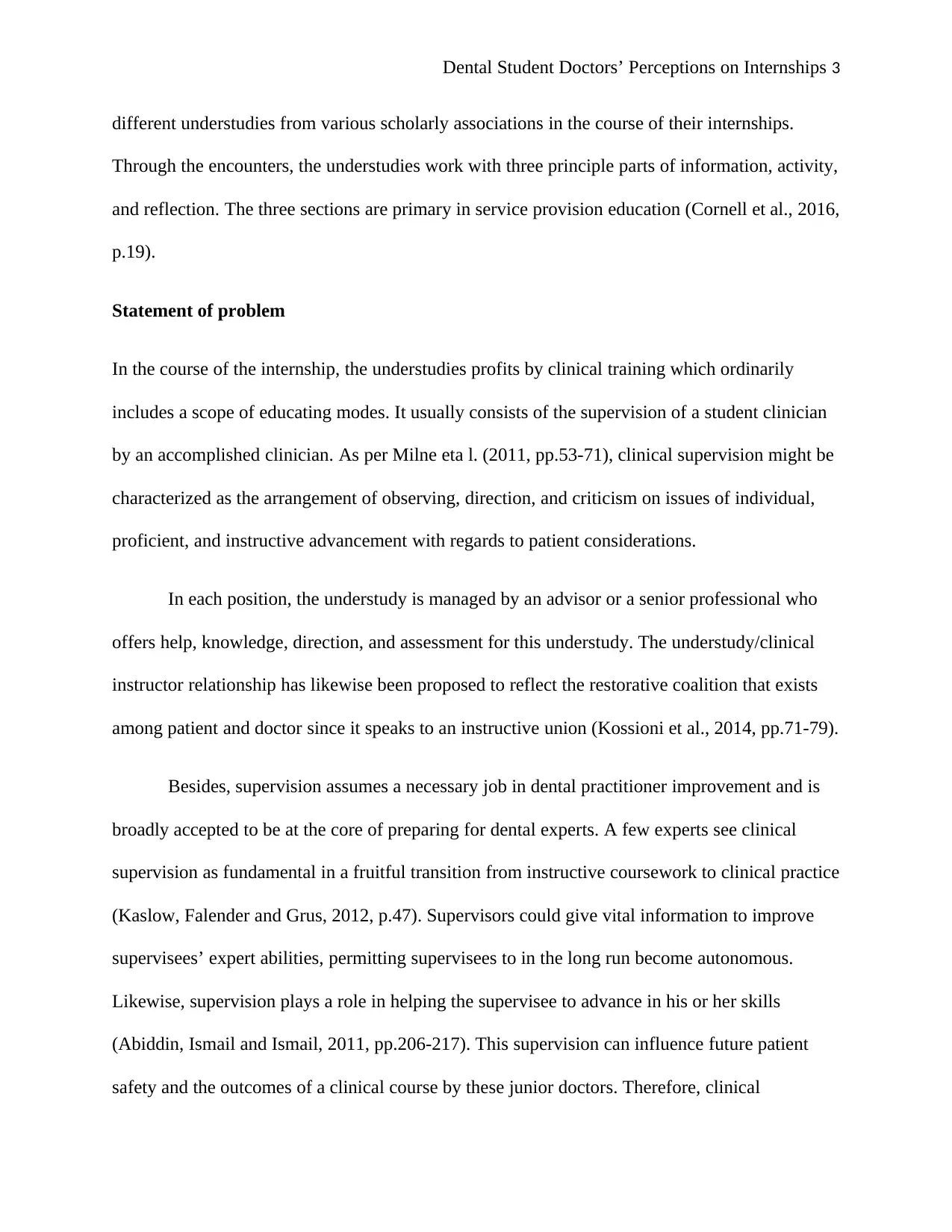
Dental Student Doctors’ Perceptions on Internships 3
different understudies from various scholarly associations in the course of their internships.
Through the encounters, the understudies work with three principle parts of information, activity,
and reflection. The three sections are primary in service provision education (Cornell et al., 2016,
p.19).
Statement of problem
In the course of the internship, the understudies profits by clinical training which ordinarily
includes a scope of educating modes. It usually consists of the supervision of a student clinician
by an accomplished clinician. As per Milne eta l. (2011, pp.53-71), clinical supervision might be
characterized as the arrangement of observing, direction, and criticism on issues of individual,
proficient, and instructive advancement with regards to patient considerations.
In each position, the understudy is managed by an advisor or a senior professional who
offers help, knowledge, direction, and assessment for this understudy. The understudy/clinical
instructor relationship has likewise been proposed to reflect the restorative coalition that exists
among patient and doctor since it speaks to an instructive union (Kossioni et al., 2014, pp.71-79).
Besides, supervision assumes a necessary job in dental practitioner improvement and is
broadly accepted to be at the core of preparing for dental experts. A few experts see clinical
supervision as fundamental in a fruitful transition from instructive coursework to clinical practice
(Kaslow, Falender and Grus, 2012, p.47). Supervisors could give vital information to improve
supervisees’ expert abilities, permitting supervisees to in the long run become autonomous.
Likewise, supervision plays a role in helping the supervisee to advance in his or her skills
(Abiddin, Ismail and Ismail, 2011, pp.206-217). This supervision can influence future patient
safety and the outcomes of a clinical course by these junior doctors. Therefore, clinical
different understudies from various scholarly associations in the course of their internships.
Through the encounters, the understudies work with three principle parts of information, activity,
and reflection. The three sections are primary in service provision education (Cornell et al., 2016,
p.19).
Statement of problem
In the course of the internship, the understudies profits by clinical training which ordinarily
includes a scope of educating modes. It usually consists of the supervision of a student clinician
by an accomplished clinician. As per Milne eta l. (2011, pp.53-71), clinical supervision might be
characterized as the arrangement of observing, direction, and criticism on issues of individual,
proficient, and instructive advancement with regards to patient considerations.
In each position, the understudy is managed by an advisor or a senior professional who
offers help, knowledge, direction, and assessment for this understudy. The understudy/clinical
instructor relationship has likewise been proposed to reflect the restorative coalition that exists
among patient and doctor since it speaks to an instructive union (Kossioni et al., 2014, pp.71-79).
Besides, supervision assumes a necessary job in dental practitioner improvement and is
broadly accepted to be at the core of preparing for dental experts. A few experts see clinical
supervision as fundamental in a fruitful transition from instructive coursework to clinical practice
(Kaslow, Falender and Grus, 2012, p.47). Supervisors could give vital information to improve
supervisees’ expert abilities, permitting supervisees to in the long run become autonomous.
Likewise, supervision plays a role in helping the supervisee to advance in his or her skills
(Abiddin, Ismail and Ismail, 2011, pp.206-217). This supervision can influence future patient
safety and the outcomes of a clinical course by these junior doctors. Therefore, clinical
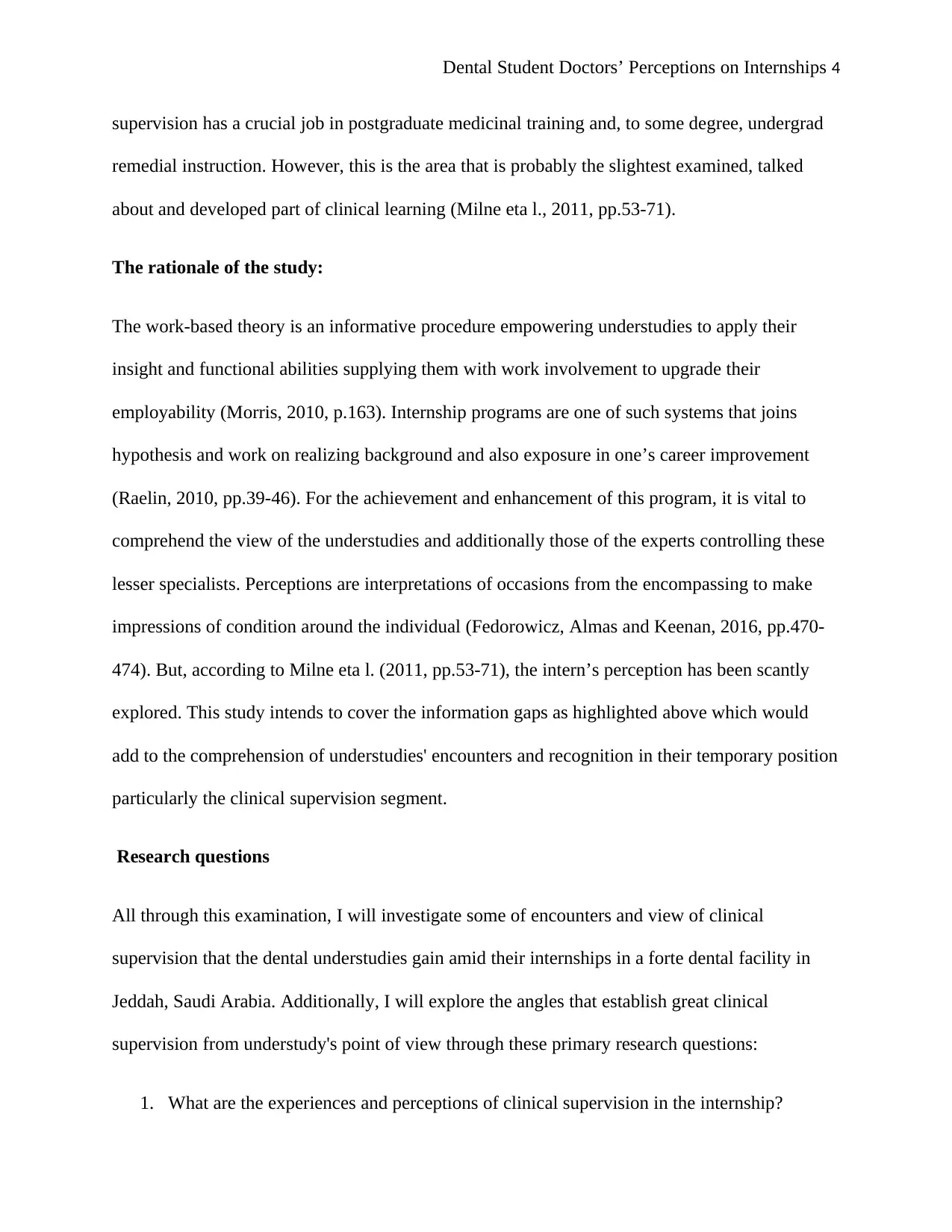
Dental Student Doctors’ Perceptions on Internships 4
supervision has a crucial job in postgraduate medicinal training and, to some degree, undergrad
remedial instruction. However, this is the area that is probably the slightest examined, talked
about and developed part of clinical learning (Milne eta l., 2011, pp.53-71).
The rationale of the study:
The work-based theory is an informative procedure empowering understudies to apply their
insight and functional abilities supplying them with work involvement to upgrade their
employability (Morris, 2010, p.163). Internship programs are one of such systems that joins
hypothesis and work on realizing background and also exposure in one’s career improvement
(Raelin, 2010, pp.39-46). For the achievement and enhancement of this program, it is vital to
comprehend the view of the understudies and additionally those of the experts controlling these
lesser specialists. Perceptions are interpretations of occasions from the encompassing to make
impressions of condition around the individual (Fedorowicz, Almas and Keenan, 2016, pp.470-
474). But, according to Milne eta l. (2011, pp.53-71), the intern’s perception has been scantly
explored. This study intends to cover the information gaps as highlighted above which would
add to the comprehension of understudies' encounters and recognition in their temporary position
particularly the clinical supervision segment.
Research questions
All through this examination, I will investigate some of encounters and view of clinical
supervision that the dental understudies gain amid their internships in a forte dental facility in
Jeddah, Saudi Arabia. Additionally, I will explore the angles that establish great clinical
supervision from understudy's point of view through these primary research questions:
1. What are the experiences and perceptions of clinical supervision in the internship?
supervision has a crucial job in postgraduate medicinal training and, to some degree, undergrad
remedial instruction. However, this is the area that is probably the slightest examined, talked
about and developed part of clinical learning (Milne eta l., 2011, pp.53-71).
The rationale of the study:
The work-based theory is an informative procedure empowering understudies to apply their
insight and functional abilities supplying them with work involvement to upgrade their
employability (Morris, 2010, p.163). Internship programs are one of such systems that joins
hypothesis and work on realizing background and also exposure in one’s career improvement
(Raelin, 2010, pp.39-46). For the achievement and enhancement of this program, it is vital to
comprehend the view of the understudies and additionally those of the experts controlling these
lesser specialists. Perceptions are interpretations of occasions from the encompassing to make
impressions of condition around the individual (Fedorowicz, Almas and Keenan, 2016, pp.470-
474). But, according to Milne eta l. (2011, pp.53-71), the intern’s perception has been scantly
explored. This study intends to cover the information gaps as highlighted above which would
add to the comprehension of understudies' encounters and recognition in their temporary position
particularly the clinical supervision segment.
Research questions
All through this examination, I will investigate some of encounters and view of clinical
supervision that the dental understudies gain amid their internships in a forte dental facility in
Jeddah, Saudi Arabia. Additionally, I will explore the angles that establish great clinical
supervision from understudy's point of view through these primary research questions:
1. What are the experiences and perceptions of clinical supervision in the internship?
Secure Best Marks with AI Grader
Need help grading? Try our AI Grader for instant feedback on your assignments.
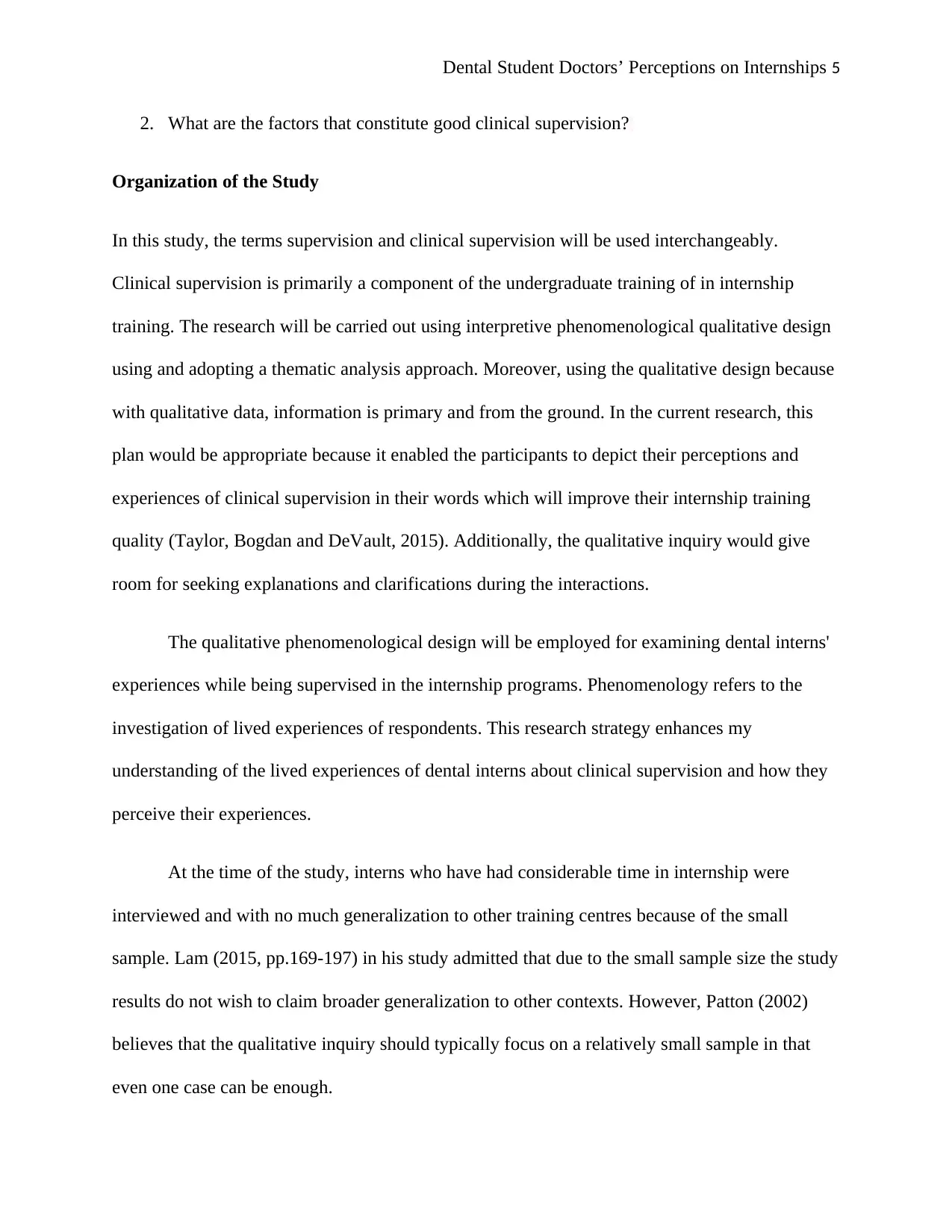
Dental Student Doctors’ Perceptions on Internships 5
2. What are the factors that constitute good clinical supervision?
Organization of the Study
In this study, the terms supervision and clinical supervision will be used interchangeably.
Clinical supervision is primarily a component of the undergraduate training of in internship
training. The research will be carried out using interpretive phenomenological qualitative design
using and adopting a thematic analysis approach. Moreover, using the qualitative design because
with qualitative data, information is primary and from the ground. In the current research, this
plan would be appropriate because it enabled the participants to depict their perceptions and
experiences of clinical supervision in their words which will improve their internship training
quality (Taylor, Bogdan and DeVault, 2015). Additionally, the qualitative inquiry would give
room for seeking explanations and clarifications during the interactions.
The qualitative phenomenological design will be employed for examining dental interns'
experiences while being supervised in the internship programs. Phenomenology refers to the
investigation of lived experiences of respondents. This research strategy enhances my
understanding of the lived experiences of dental interns about clinical supervision and how they
perceive their experiences.
At the time of the study, interns who have had considerable time in internship were
interviewed and with no much generalization to other training centres because of the small
sample. Lam (2015, pp.169-197) in his study admitted that due to the small sample size the study
results do not wish to claim broader generalization to other contexts. However, Patton (2002)
believes that the qualitative inquiry should typically focus on a relatively small sample in that
even one case can be enough.
2. What are the factors that constitute good clinical supervision?
Organization of the Study
In this study, the terms supervision and clinical supervision will be used interchangeably.
Clinical supervision is primarily a component of the undergraduate training of in internship
training. The research will be carried out using interpretive phenomenological qualitative design
using and adopting a thematic analysis approach. Moreover, using the qualitative design because
with qualitative data, information is primary and from the ground. In the current research, this
plan would be appropriate because it enabled the participants to depict their perceptions and
experiences of clinical supervision in their words which will improve their internship training
quality (Taylor, Bogdan and DeVault, 2015). Additionally, the qualitative inquiry would give
room for seeking explanations and clarifications during the interactions.
The qualitative phenomenological design will be employed for examining dental interns'
experiences while being supervised in the internship programs. Phenomenology refers to the
investigation of lived experiences of respondents. This research strategy enhances my
understanding of the lived experiences of dental interns about clinical supervision and how they
perceive their experiences.
At the time of the study, interns who have had considerable time in internship were
interviewed and with no much generalization to other training centres because of the small
sample. Lam (2015, pp.169-197) in his study admitted that due to the small sample size the study
results do not wish to claim broader generalization to other contexts. However, Patton (2002)
believes that the qualitative inquiry should typically focus on a relatively small sample in that
even one case can be enough.
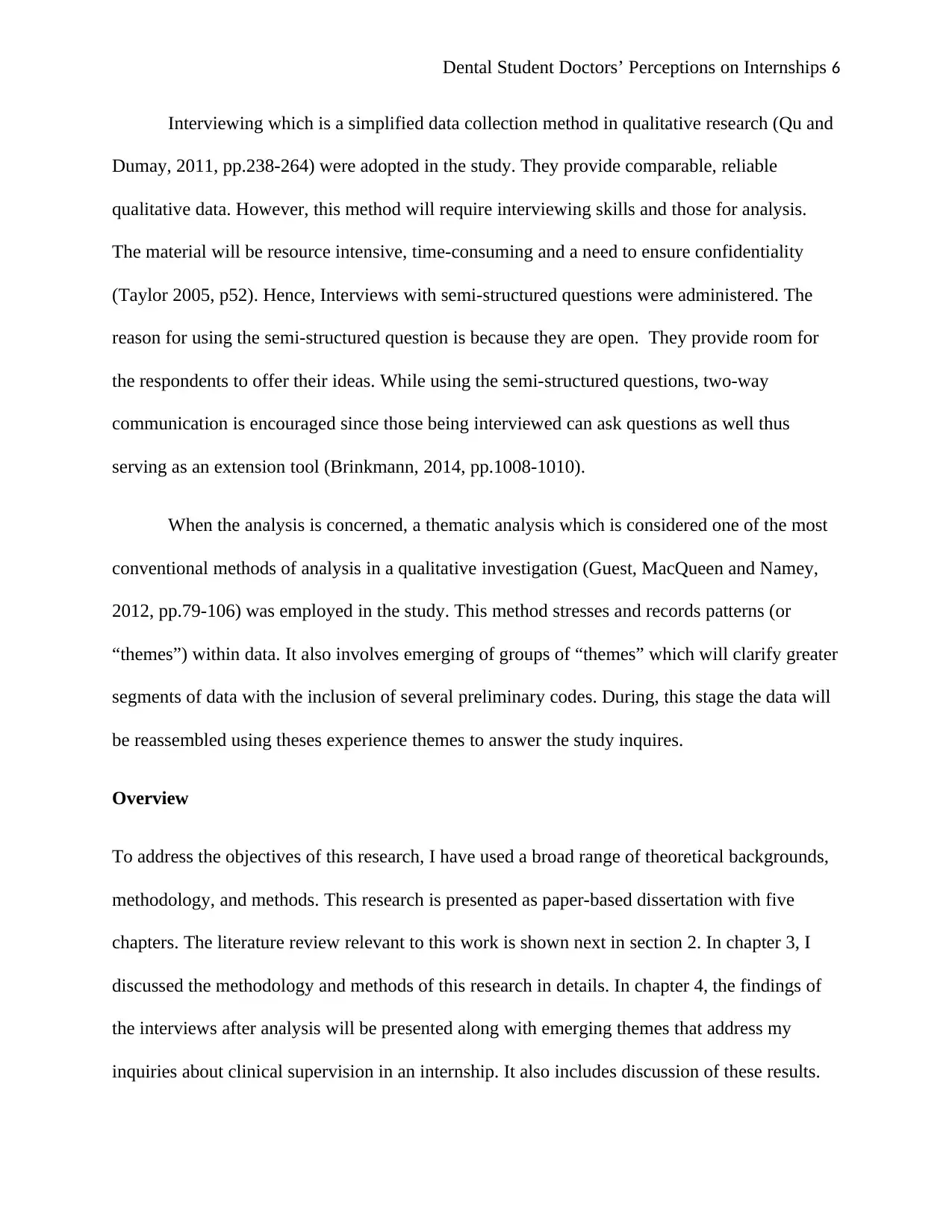
Dental Student Doctors’ Perceptions on Internships 6
Interviewing which is a simplified data collection method in qualitative research (Qu and
Dumay, 2011, pp.238-264) were adopted in the study. They provide comparable, reliable
qualitative data. However, this method will require interviewing skills and those for analysis.
The material will be resource intensive, time-consuming and a need to ensure confidentiality
(Taylor 2005, p52). Hence, Interviews with semi-structured questions were administered. The
reason for using the semi-structured question is because they are open. They provide room for
the respondents to offer their ideas. While using the semi-structured questions, two-way
communication is encouraged since those being interviewed can ask questions as well thus
serving as an extension tool (Brinkmann, 2014, pp.1008-1010).
When the analysis is concerned, a thematic analysis which is considered one of the most
conventional methods of analysis in a qualitative investigation (Guest, MacQueen and Namey,
2012, pp.79-106) was employed in the study. This method stresses and records patterns (or
“themes”) within data. It also involves emerging of groups of “themes” which will clarify greater
segments of data with the inclusion of several preliminary codes. During, this stage the data will
be reassembled using theses experience themes to answer the study inquires.
Overview
To address the objectives of this research, I have used a broad range of theoretical backgrounds,
methodology, and methods. This research is presented as paper-based dissertation with five
chapters. The literature review relevant to this work is shown next in section 2. In chapter 3, I
discussed the methodology and methods of this research in details. In chapter 4, the findings of
the interviews after analysis will be presented along with emerging themes that address my
inquiries about clinical supervision in an internship. It also includes discussion of these results.
Interviewing which is a simplified data collection method in qualitative research (Qu and
Dumay, 2011, pp.238-264) were adopted in the study. They provide comparable, reliable
qualitative data. However, this method will require interviewing skills and those for analysis.
The material will be resource intensive, time-consuming and a need to ensure confidentiality
(Taylor 2005, p52). Hence, Interviews with semi-structured questions were administered. The
reason for using the semi-structured question is because they are open. They provide room for
the respondents to offer their ideas. While using the semi-structured questions, two-way
communication is encouraged since those being interviewed can ask questions as well thus
serving as an extension tool (Brinkmann, 2014, pp.1008-1010).
When the analysis is concerned, a thematic analysis which is considered one of the most
conventional methods of analysis in a qualitative investigation (Guest, MacQueen and Namey,
2012, pp.79-106) was employed in the study. This method stresses and records patterns (or
“themes”) within data. It also involves emerging of groups of “themes” which will clarify greater
segments of data with the inclusion of several preliminary codes. During, this stage the data will
be reassembled using theses experience themes to answer the study inquires.
Overview
To address the objectives of this research, I have used a broad range of theoretical backgrounds,
methodology, and methods. This research is presented as paper-based dissertation with five
chapters. The literature review relevant to this work is shown next in section 2. In chapter 3, I
discussed the methodology and methods of this research in details. In chapter 4, the findings of
the interviews after analysis will be presented along with emerging themes that address my
inquiries about clinical supervision in an internship. It also includes discussion of these results.

Dental Student Doctors’ Perceptions on Internships 7
Finally, chapter 5 will includes recommendations and limitations of this research. It also will
involve some personal reflections on the research process completed as part of this thesis.
Finally, chapter 5 will includes recommendations and limitations of this research. It also will
involve some personal reflections on the research process completed as part of this thesis.
Paraphrase This Document
Need a fresh take? Get an instant paraphrase of this document with our AI Paraphraser
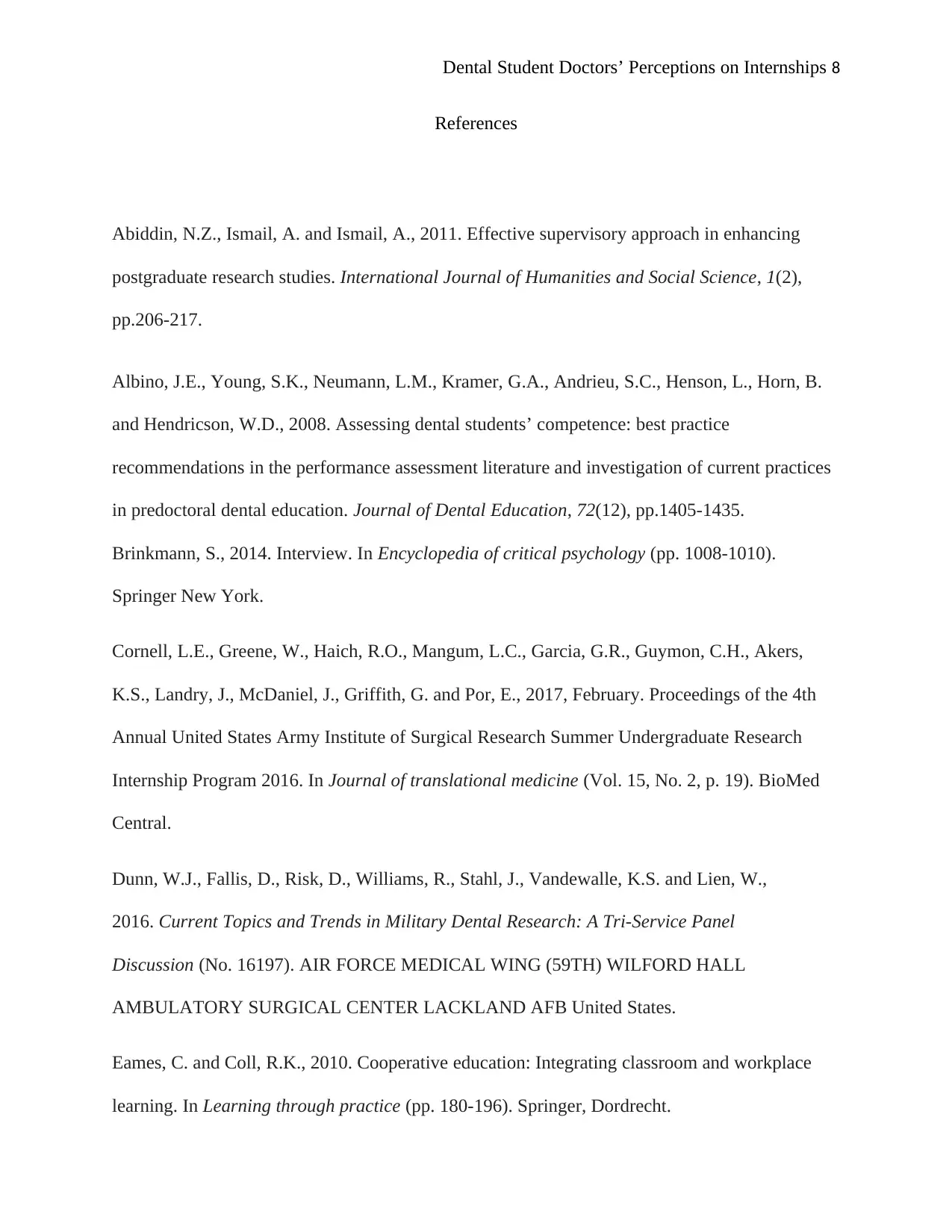
Dental Student Doctors’ Perceptions on Internships 8
References
Abiddin, N.Z., Ismail, A. and Ismail, A., 2011. Effective supervisory approach in enhancing
postgraduate research studies. International Journal of Humanities and Social Science, 1(2),
pp.206-217.
Albino, J.E., Young, S.K., Neumann, L.M., Kramer, G.A., Andrieu, S.C., Henson, L., Horn, B.
and Hendricson, W.D., 2008. Assessing dental students’ competence: best practice
recommendations in the performance assessment literature and investigation of current practices
in predoctoral dental education. Journal of Dental Education, 72(12), pp.1405-1435.
Brinkmann, S., 2014. Interview. In Encyclopedia of critical psychology (pp. 1008-1010).
Springer New York.
Cornell, L.E., Greene, W., Haich, R.O., Mangum, L.C., Garcia, G.R., Guymon, C.H., Akers,
K.S., Landry, J., McDaniel, J., Griffith, G. and Por, E., 2017, February. Proceedings of the 4th
Annual United States Army Institute of Surgical Research Summer Undergraduate Research
Internship Program 2016. In Journal of translational medicine (Vol. 15, No. 2, p. 19). BioMed
Central.
Dunn, W.J., Fallis, D., Risk, D., Williams, R., Stahl, J., Vandewalle, K.S. and Lien, W.,
2016. Current Topics and Trends in Military Dental Research: A Tri-Service Panel
Discussion (No. 16197). AIR FORCE MEDICAL WING (59TH) WILFORD HALL
AMBULATORY SURGICAL CENTER LACKLAND AFB United States.
Eames, C. and Coll, R.K., 2010. Cooperative education: Integrating classroom and workplace
learning. In Learning through practice (pp. 180-196). Springer, Dordrecht.
References
Abiddin, N.Z., Ismail, A. and Ismail, A., 2011. Effective supervisory approach in enhancing
postgraduate research studies. International Journal of Humanities and Social Science, 1(2),
pp.206-217.
Albino, J.E., Young, S.K., Neumann, L.M., Kramer, G.A., Andrieu, S.C., Henson, L., Horn, B.
and Hendricson, W.D., 2008. Assessing dental students’ competence: best practice
recommendations in the performance assessment literature and investigation of current practices
in predoctoral dental education. Journal of Dental Education, 72(12), pp.1405-1435.
Brinkmann, S., 2014. Interview. In Encyclopedia of critical psychology (pp. 1008-1010).
Springer New York.
Cornell, L.E., Greene, W., Haich, R.O., Mangum, L.C., Garcia, G.R., Guymon, C.H., Akers,
K.S., Landry, J., McDaniel, J., Griffith, G. and Por, E., 2017, February. Proceedings of the 4th
Annual United States Army Institute of Surgical Research Summer Undergraduate Research
Internship Program 2016. In Journal of translational medicine (Vol. 15, No. 2, p. 19). BioMed
Central.
Dunn, W.J., Fallis, D., Risk, D., Williams, R., Stahl, J., Vandewalle, K.S. and Lien, W.,
2016. Current Topics and Trends in Military Dental Research: A Tri-Service Panel
Discussion (No. 16197). AIR FORCE MEDICAL WING (59TH) WILFORD HALL
AMBULATORY SURGICAL CENTER LACKLAND AFB United States.
Eames, C. and Coll, R.K., 2010. Cooperative education: Integrating classroom and workplace
learning. In Learning through practice (pp. 180-196). Springer, Dordrecht.
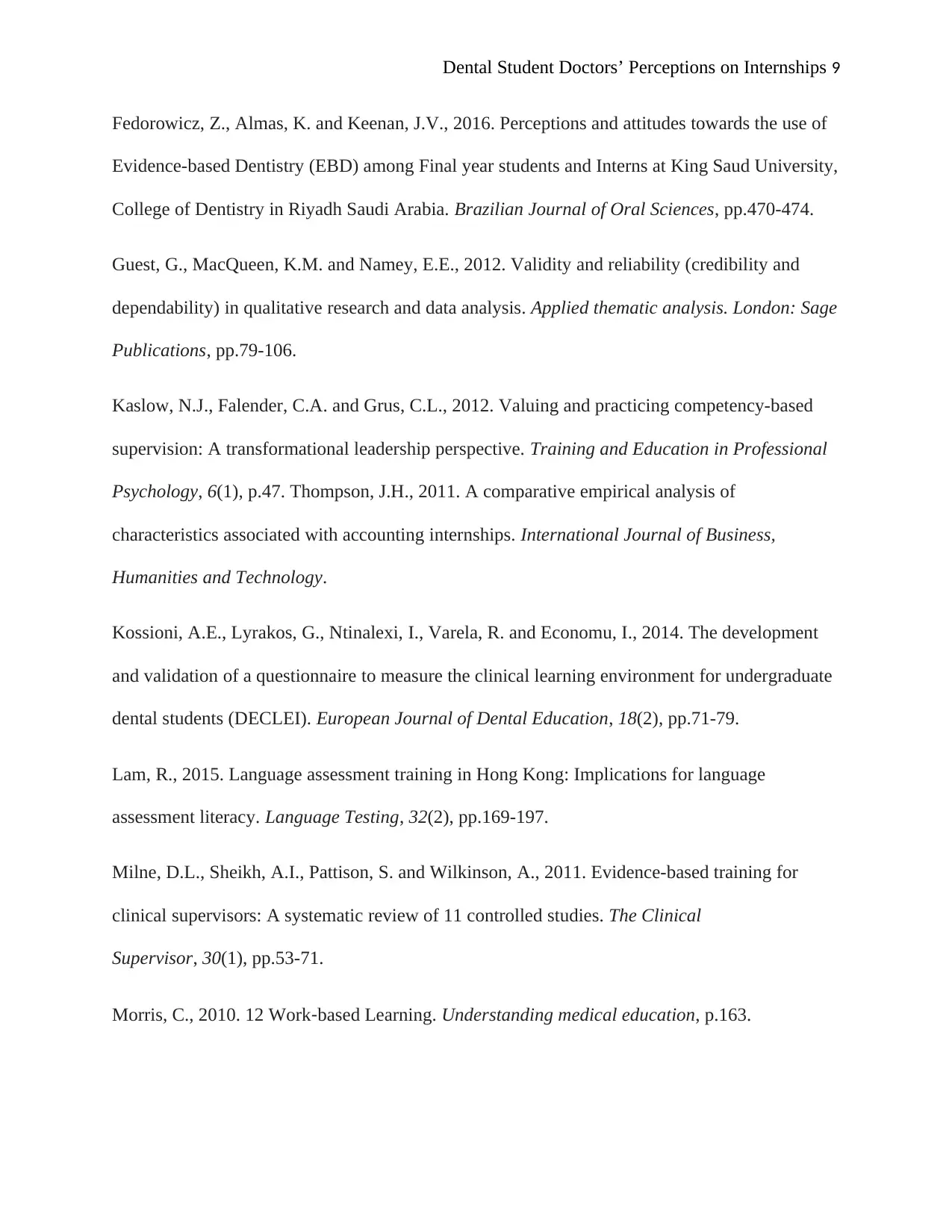
Dental Student Doctors’ Perceptions on Internships 9
Fedorowicz, Z., Almas, K. and Keenan, J.V., 2016. Perceptions and attitudes towards the use of
Evidence-based Dentistry (EBD) among Final year students and Interns at King Saud University,
College of Dentistry in Riyadh Saudi Arabia. Brazilian Journal of Oral Sciences, pp.470-474.
Guest, G., MacQueen, K.M. and Namey, E.E., 2012. Validity and reliability (credibility and
dependability) in qualitative research and data analysis. Applied thematic analysis. London: Sage
Publications, pp.79-106.
Kaslow, N.J., Falender, C.A. and Grus, C.L., 2012. Valuing and practicing competency-based
supervision: A transformational leadership perspective. Training and Education in Professional
Psychology, 6(1), p.47. Thompson, J.H., 2011. A comparative empirical analysis of
characteristics associated with accounting internships. International Journal of Business,
Humanities and Technology.
Kossioni, A.E., Lyrakos, G., Ntinalexi, I., Varela, R. and Economu, I., 2014. The development
and validation of a questionnaire to measure the clinical learning environment for undergraduate
dental students (DECLEI). European Journal of Dental Education, 18(2), pp.71-79.
Lam, R., 2015. Language assessment training in Hong Kong: Implications for language
assessment literacy. Language Testing, 32(2), pp.169-197.
Milne, D.L., Sheikh, A.I., Pattison, S. and Wilkinson, A., 2011. Evidence-based training for
clinical supervisors: A systematic review of 11 controlled studies. The Clinical
Supervisor, 30(1), pp.53-71.
Morris, C., 2010. 12 Work‐based Learning. Understanding medical education, p.163.
Fedorowicz, Z., Almas, K. and Keenan, J.V., 2016. Perceptions and attitudes towards the use of
Evidence-based Dentistry (EBD) among Final year students and Interns at King Saud University,
College of Dentistry in Riyadh Saudi Arabia. Brazilian Journal of Oral Sciences, pp.470-474.
Guest, G., MacQueen, K.M. and Namey, E.E., 2012. Validity and reliability (credibility and
dependability) in qualitative research and data analysis. Applied thematic analysis. London: Sage
Publications, pp.79-106.
Kaslow, N.J., Falender, C.A. and Grus, C.L., 2012. Valuing and practicing competency-based
supervision: A transformational leadership perspective. Training and Education in Professional
Psychology, 6(1), p.47. Thompson, J.H., 2011. A comparative empirical analysis of
characteristics associated with accounting internships. International Journal of Business,
Humanities and Technology.
Kossioni, A.E., Lyrakos, G., Ntinalexi, I., Varela, R. and Economu, I., 2014. The development
and validation of a questionnaire to measure the clinical learning environment for undergraduate
dental students (DECLEI). European Journal of Dental Education, 18(2), pp.71-79.
Lam, R., 2015. Language assessment training in Hong Kong: Implications for language
assessment literacy. Language Testing, 32(2), pp.169-197.
Milne, D.L., Sheikh, A.I., Pattison, S. and Wilkinson, A., 2011. Evidence-based training for
clinical supervisors: A systematic review of 11 controlled studies. The Clinical
Supervisor, 30(1), pp.53-71.
Morris, C., 2010. 12 Work‐based Learning. Understanding medical education, p.163.
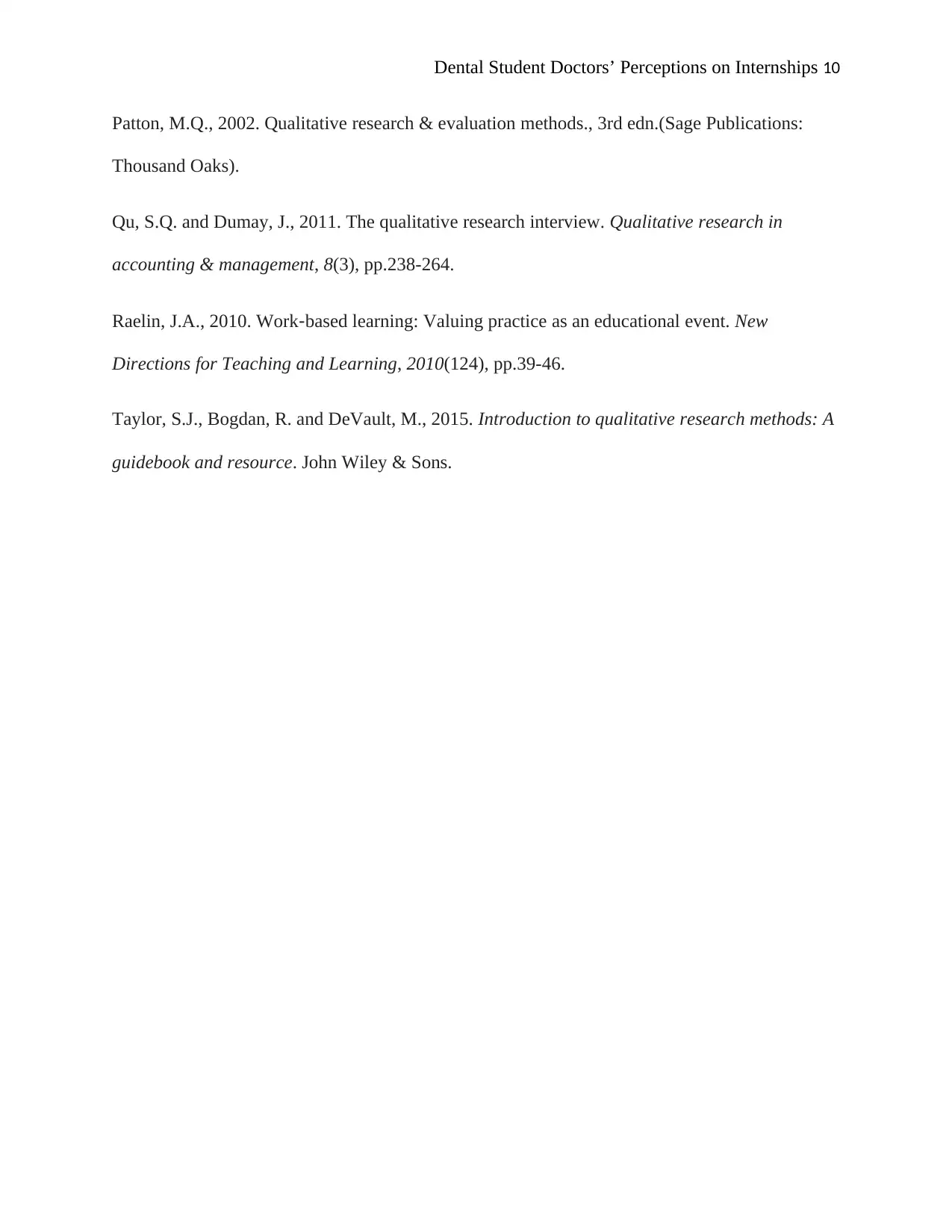
Dental Student Doctors’ Perceptions on Internships 10
Patton, M.Q., 2002. Qualitative research & evaluation methods., 3rd edn.(Sage Publications:
Thousand Oaks).
Qu, S.Q. and Dumay, J., 2011. The qualitative research interview. Qualitative research in
accounting & management, 8(3), pp.238-264.
Raelin, J.A., 2010. Work‐based learning: Valuing practice as an educational event. New
Directions for Teaching and Learning, 2010(124), pp.39-46.
Taylor, S.J., Bogdan, R. and DeVault, M., 2015. Introduction to qualitative research methods: A
guidebook and resource. John Wiley & Sons.
Patton, M.Q., 2002. Qualitative research & evaluation methods., 3rd edn.(Sage Publications:
Thousand Oaks).
Qu, S.Q. and Dumay, J., 2011. The qualitative research interview. Qualitative research in
accounting & management, 8(3), pp.238-264.
Raelin, J.A., 2010. Work‐based learning: Valuing practice as an educational event. New
Directions for Teaching and Learning, 2010(124), pp.39-46.
Taylor, S.J., Bogdan, R. and DeVault, M., 2015. Introduction to qualitative research methods: A
guidebook and resource. John Wiley & Sons.
1 out of 10
Related Documents
Your All-in-One AI-Powered Toolkit for Academic Success.
+13062052269
info@desklib.com
Available 24*7 on WhatsApp / Email
![[object Object]](/_next/static/media/star-bottom.7253800d.svg)
Unlock your academic potential
© 2024 | Zucol Services PVT LTD | All rights reserved.




